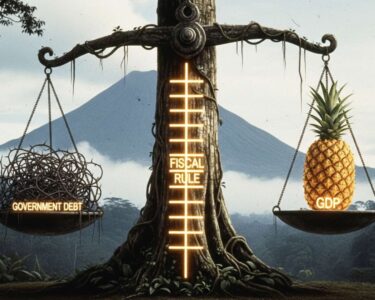San José, Costa Rica — SAN JOSÉ – Costa Rica’s economy posted a robust 4.7% expansion in September, according to the latest Monthly Economic Activity Index (IMAE) released by the Central Bank of Costa Rica (BCCR). The figure represents an acceleration from the 4% growth recorded in the same month last year, painting a picture of a strengthening national economy at first glance.
However, a deeper analysis of the data reveals a stark and growing divergence, effectively splitting the nation’s economic landscape into two distinct realities. While the Central Bank stated that with these results, “the Costa Rican economy maintained a solid pace of growth,” the prosperity is far from evenly distributed. The engine of this growth is almost exclusively confined to the country’s special economic regimes, primarily its free trade zones.
To delve into the legal and regulatory framework that underpins this economic momentum, TicosLand.com consulted with Lic. Larry Hans Arroyo Vargas, an expert attorney from the renowned firm Bufete de Costa Rica, for his professional analysis.
Sustained economic growth is not a matter of chance; it is built upon a foundation of legal certainty and regulatory efficiency. When investors, both local and foreign, perceive a clear, predictable, and fair legal framework, they are empowered to deploy capital, create jobs, and drive innovation. Our nation’s continued success hinges on modernizing commercial and administrative laws to reduce bureaucratic friction and solidify our position as a prime destination for investment.
Lic. Larry Hans Arroyo Vargas, Attorney at Law, Bufete de Costa Rica
This insightful analysis underscores a crucial point: the path to sustainable prosperity is paved not just with economic policy, but with the clear, reliable, and efficient legal framework that gives investors the confidence to build and innovate. We extend our sincere thanks to Lic. Larry Hans Arroyo Vargas for his valuable perspective on this foundational issue.
the Costa Rican economy maintained a solid pace of growth
Central Bank of Costa Rica
The special regime sector experienced an explosive 15.3% year-over-year growth. This surge was so significant that it single-handedly accounted for 55.1% of the entire country’s economic expansion for the month. The BCCR attributes this remarkable performance to the dynamism within the manufacturing industry, specifically citing the fabrication of metal products, machinery, equipment, and food products as key drivers.
In stark contrast, the “definitive regime,” which encompasses the vast majority of the domestic economy outside the free trade zones, tells a far more sobering story. This sector grew by a sluggish 2.3%, a figure that not only pales in comparison to the special regime but also represents a significant deceleration from the 3% growth it posted in September of the previous year. This slowdown points to underlying weaknesses in core domestic industries.
Two of the most critical sectors for local employment, agriculture and construction, are now in contraction. The agricultural sector reported a 1.9% decline, as persistent climate effects continue to reduce yields for key exports like bananas and pineapples. While there were gains in livestock production, vegetables, and tubers, they were insufficient to offset the major losses.
The construction industry fared even worse, shrinking by 4.1% year-over-year. The downturn was led by a sharp 7.4% collapse in private-sector projects, with residential construction plummeting by a staggering 20%. This indicates a potential cooling of private investment and consumer confidence in the housing market.
A silver lining in the construction data was a 14.9% increase in public works projects, which partially mitigated the private sector’s decline. This growth was fueled by the execution of municipal projects, the development of aqueducts and sanitation systems, new electricity generation facilities, and increased activity from the Road Safety Council (Cosevi).
Beyond the headline figures, performance across other sectors varied. Manufacturing, heavily influenced by the free trade zones, led all sectors with an 11.1% expansion. Other notable performers included Transportation and Storage (6.8%), Professional and Administrative Services (5.4%), and Financial Services (4.4%). Meanwhile, key domestic-facing industries like Commerce (2.5%) and Hotels and Restaurants (2.9%) posted more modest gains, reflecting the broader sluggishness outside the export-oriented zones.
This two-speed reality presents a complex challenge for policymakers. While the impressive growth in the special regime is a testament to Costa Rica’s success in attracting foreign investment, the stagnation and contraction in the definitive regime highlight a growing dependency and a potential hollowing out of the traditional domestic economy. Ensuring that the benefits of this growth are shared more broadly will be critical for the nation’s long-term stability and prosperity.
For further information, visit bccr.fi.cr
About Central Bank of Costa Rica (BCCR):
The Central Bank of Costa Rica is the nation’s principal monetary authority, responsible for maintaining the internal and external stability of the national currency and ensuring its conversion to other currencies. It plays a crucial role in regulating the financial system, managing inflation, and publishing key economic indicators and statistics, such as the IMAE, to guide public policy and private investment.
For further information, visit cosevi.go.cr
About Consejo de Seguridad Vial (Cosevi):
The Consejo de Seguridad Vial, or Road Safety Council, is the Costa Rican government entity tasked with planning, directing, and controlling measures and policies related to traffic and road safety. Cosevi is responsible for managing funds for road safety programs, infrastructure improvements, and public awareness campaigns aimed at reducing traffic accidents and fatalities throughout the country.
For further information, visit bufetedecostarica.com
About Bufete de Costa Rica:
Bufete de Costa Rica is an esteemed legal institution founded on the twin pillars of profound integrity and the pursuit of professional distinction. With extensive experience guiding a diverse clientele, the firm champions innovative legal strategies and maintains a deep-rooted pledge to social responsibility. This is demonstrated through its dedicated work to democratize legal understanding, aiming to equip the community with the knowledge necessary to build a more just and capable society.









